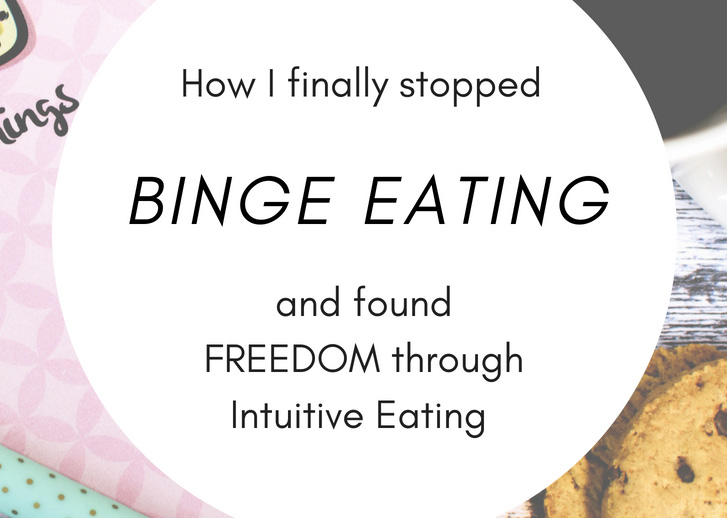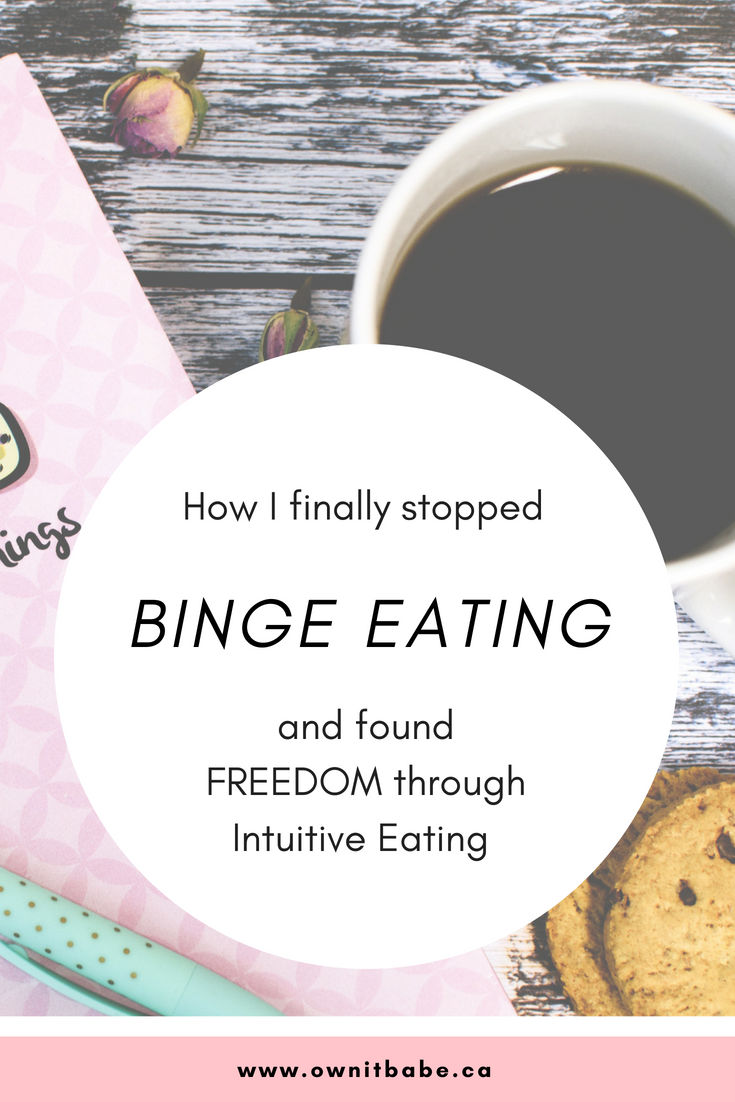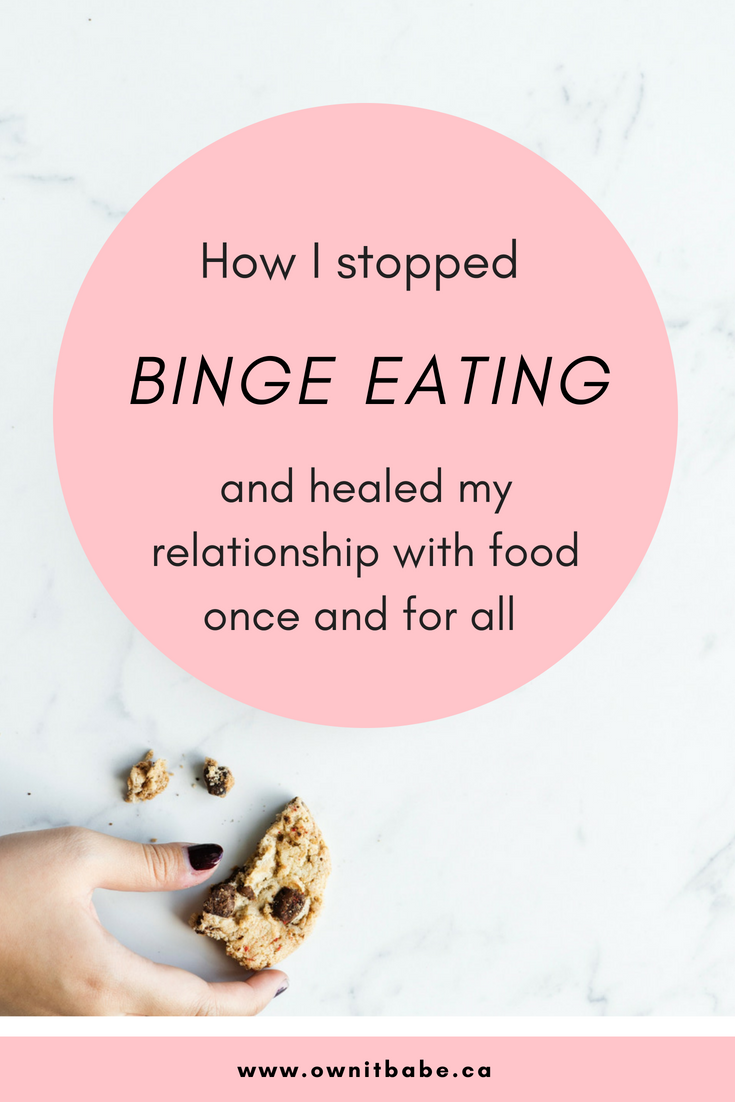
How I stopped binge eating
People always ask me how I stopped binge eating. It is one of the most vulnerable things to admit for me, but for years I struggled with binge eating in secret.
I remember my first binge like it was yesterday. For about one year, I followed a strict diet of mostly plant-based foods and cold-pressed juices. I was exercising for up to 3 hours, 4-5 days per week and was in a big caloric deficit.
One morning, I woke up and felt a very primal sense of hunger. Not only was my tummy rumbling, I actually felt this hunger at the roof of my mouth, I felt it in my throat and I felt it taking over my entire body. I must eat. Now.
I had never felt like this before. Sure, I felt very deprived during my vegan-phase, but I thought I was doing the right thing for my body. While some people were getting concerned about my obsession with healthy eating, most of them applauded me for my “discipline and willpower”.
That morning, I drove to the store on autopilot, filled my shopping cart with frozen pizzas, ice cream, cereal, chocolate, chips, cookies and cakes and drove home. I was still on autopilot, as I unwrapped one food after another and ate and ate and ate. Mortified, I asked myself: What is going on? I have no control over my body!
Little did I know that this day was the beginning of 12 years of binge eating, restricting, dieting and obsessing over food and my body.
What is binge eating?
If you haven’t struggled with binge eating, it is a very hard concept to grasp. Why would anybody in their right mind eat hundreds, even thousands of calories in one sitting? I remember trying to explain my behavior to a friend back then, without actually knowing that it was binge eating. Their response was: “Why do you do this to yourself? Why not stop when you’re full?”
The truth is that while no binge eater wants to suffer with the inability to stop eating and the psychological effects of it, it seems that they’re unable to control this behavior.
How does one develop binge eating?
Essentially, binge eating is a behaviour that is engrained in our DNA from our hunter-gatherer days. Back then there was no abundance of food. It was either feast or famine. Once our ancestors didn’t have access to food for an extended period of time, their bodies understood that they had to drive up their hunger hormones to make them seek out food.
Then, when they finally killed an animal or found something to eat, their bodies made them eat like there was no tomorrow. The reason was that quite literally, tomorrow they might not have food anymore for a long time.
You see our bodies are very smart. They want us to survive. They understand that once there is not enough food around (aka once we are in a caloric deficit through dieting), they have to make us hungrier and more obsessed with food, so that we find food to eat.
The reason we have no control over putting the food down is because in our heads we are already planning our next diet. For our body, this means that it understands that there will be another period of starvation coming up. The result of this is that our body will make us eat an insurmountable amount of food. This way, it can store this energy to use for the upcoming days of our restrictive behaviours.
Why we never binge on lettuce and broccoli
When we binge eat, we usually don’t eat bags of broccoli or spinach. We eat very calorie dense foods that usually have a combination of carbohydrates and fats. Think baked goods, pizza or ice cream.
This is actually a very smart mechanism of our body. It wants us to eat the biggest amount of calories in the shortest amount of time. This way, it can store up as much as possible for the upcoming famine (aka diet). Our body knows that if we ate broccoli, we would feel full way sooner and wouldn’t get the same amount of calories in. Just think: If our ancestors wouldn’t have had these mechanisms in their bodies, they would have never survived. Binge eating used to be beneficial for our survival. Now it’s time to teach our bodies that we don’t need to binge to survive anymore.
What does a typical day of a binge eater look like?
This is my personal experience, so it might be slightly different for you, depending on your past behaviors with dieting and/or trauma.
- Morning: I ate a very low-calorie, low-carb breakfast of either egg whites and spinach or Greek yoghurt, telling myself I will be good today.
- Mid-Morning: Still very convinced that I would be good – as if food has the power over us to make us good or bad people – I would go for a juice or a protein shake.
- Lunch: Vegetable soup or chicken with broccoli, depending on how strict I was that day.
- Afternoon: The urge to binge would start coming in like a wave in the ocean. I felt scared. At the same time I knew that I wouldn’t be able to resist it forever. I would start making excuses as to why it would be okay to binge eat “one last time” and “get it out of my system forever”. If you are a binge eater, you know exactly what I’m talking about. Every binge is considered the last binge. Every binge is there to get the cravings and urges out of our system. We tell ourselves that this is the last time. Personally, I already made plans on how I would counteract the aftermath of this binge, before I even gave into the urge. I’d plan the next day in the gym, I’d plan my diet and how I would “lose the weight” I’d put on.
- Early evening: I gave in. As I would drive to the store, I would make a list in my head of all the foods I really wanted to eat and usually wouldn’t allow myself. This would mainly be simple carbohydrates and fatty foods, like cheesecake, loafs of bread with butter, donuts, pizza, cereal, ice cream, etc.
- Evening: I would turn on a Netflix documentary or a series and numb out. I would lay out all the food in front of me and eat everything I could. Mind you, I would only do this when my husband wasn’t around, because he couldn’t find out about my secret. Once I physically couldn’t eat another bite, I would pack the rest up and throw it in the garbage.
- Late night: Once my tummy had more room, I would go back to the garbage bin and pick out the foods I could still eat. This was the most humiliating part of it all. I couldn’t even control myself when the food was already in the garbage.
How I turned it around and stopped binging
Now that you know all the details about this self-destructive behaviour that so many people suffer from, you might wonder: How did I stop a behaviour I engaged in for so many years? How did I learn to just “eat like a normal person”?
I will try and break it down for you step-by-step, so you can free yourself as well.
I understood why I was binge eating
As I explained at the beginning of this article, our bodies are wired to binge eat, as soon as they undergo a period of restricting. This period can occur through a diet, an attempt to lose weight, a period of sickness or through concerned parents in your childhood that didn’t allow you to have sweets.
It’s not your fault that you binge eat.
It is your body’s natural response to deprivation.
It made sense that in order to stop binge eating, I needed to stop restricting my food intake. This took me years to truly internalize. I was convinced that it was my lack of willpower and discipline that drove me to eat massive quantities of food.
Once I understood where this behavior came from, I was then able to take action and undo the damage step-by-step.
I forgave myself for beating myself up
Another important step is to stop being mad at your body. The psychological effects of binge eating range from guilt and shame all the way to depression and anxiety, even suicidal thoughts in some cases. Once I sat down, put one hand on my heart, closed my eyes, breathed in and said to myself “I forgive you”, I was able to start over.
I forgave myself for starving my body. I said “I’m sorry” to my body for treating it so poorly. Starving our bodies through a caloric deficit and excessive exercise is just as detrimental to our health as binge eating is. I had to forgive myself for both.
If you are still struggling, I encourage you to really surrender to your body’s needs. To understand that all your body did is react to a period of starvation.
It’s not your fault that you binge eat.
You didn’t fail. It was the diet that failed you.
I stopped looking for a magic cure and quit dieting
The cure for binge eating is NOT a diet. Going Paleo will NOT prevent you from binge eating. Trying intermittent fasting will NOT cure your binge eating. Planning for a diet after your holiday will only perpetuate the cycle, instead of healing you.
This is a hard pill to swallow. My body was my identity. I was the health nut in my family. I was the fit girl in my circle of friends. It was very hard to give up that part of me, but I had to. The only way to stop binge eating FOREVER, not just for 2 or 3 years, is to stop dieting and start eating.
I stopped living in the all-or-nothing mindset
The triggers for a binge kept getting more and more for me. If I ate an extra 50 grams of sweet potato for lunch, my whole day was ruined.
I messed up anyway, might as well get my cravings out of the way and eat what I actually want. Just one last time and then I’ll be good forever.
I worked hard on eliminating my tracking and counting behaviors around food. I stopped thinking that I either eat perfectly, or I binge.
There is an in-between called life. Life happens in the grey area, not in the black-and-white space.
Whenever I would over-eat at lunch or feel full after breakfast (former trigger for me), I remembered that it wasn’t a big deal to feel full for an hour. It would be much more damaging to think all-or-nothing and let it end in a binge followed by restriction.
I stopped labeling foods as good and bad – there were no more rules
When I described my former thinking of “I am going to be good today”, what I meant is that I would only eat foods I would label as good or healthy. Vegetables, some fruits, chicken breast and protein shakes were considered good. Everything else was bad, although there was levels of bad. For example, sweet potato and other starchy vegetables were off limits. However, they were still better than chocolate or ice cream. As you can tell, I had a lot of rules around food.
In order to stop feeling triggered for a binge, I had to view all foods as fuel for my body. Not moral issues.
If I wanted to eat ice cream for breakfast, I would allow myself to eat ice cream for breakfast without thinking that I was a terrible person. I was just a girl that ate ice cream for breakfast and that’s it.
I went through a phase of over-eating
At the beginning of my healing journey, it was important to allow for all foods without limits. I had to teach my body that we were not stuck in the hunter-gatherer days anymore. There will always be an abundance of food around and my body didn’t have to unlock those ancestral behaviors anymore.
We were safe.
In order for this safety to really come through for my body, I had to eat a lot of food. Sure, it was scary to eat without restricting the next day. However, the thought of being trapped in this cycle for the rest of my life was far worse for me than a period of gaining a few pounds.
The weight gain is completely temporary.
Your body still doesn’t understand that there is no need to store those calories for future famines. Hence, you have to give your body time to understand that it can release those calories, because there will be new calories coming in.
The initial weight gain lasted a few months for me, until my body was ready to release the weight. Those few months were far more comfortable to live with than a whole life of secret binges and the aftermath.
Eventually, I realized one day that I hadn’t overeaten in a while. Not because I consciously watched what I ate. Not because I felt bad if I overate. It happened simply because my body trusted me again and went back to its normal hunger and fullness levels.
I ate foods I actually enjoyed and still do so
Back in my dieting days, all my meals were very regimented and similar. Egg whites and spinach. Protein shakes and half an apple. Chicken breast and broccoli.
If you would put any of these food combinations in front of me now, I wouldn’t eat them.
They don’t actually taste good.
It goes both ways. If you put a whole cheesecake in front of me now, I wouldn’t eat it either.
Because it doesn’t taste good to eat a whole cake and it doesn’t feel good either.
Once you allow for all foods, without judgment, your body will regulate its hunger and fullness/satiety hormones. You will understand that it’s not satiating to eat past the point of fullness or to eat too little.
I was kind, compassionate and patient with myself
This process takes time.
I tried quitting binge eating before and implementing all these steps. However, I wasn’t patient enough. I waited two weeks, got scared about over-eating without restricting and went back to my old behaviors.
The truth is that it sometimes takes months to unravel these old behaviours. Still, it is so worth it to wait it out.
What can you do today to take the first step in your journey?
To be quite honest, I personally needed professional help from a coach and a therapist, in order to work through all of this. However, if you are currently not able to do so, I simply encourage you to start noticing your patterns and thoughts around food.
Do you feel guilty when you eat certain foods? Are you planning on another diet in the future? Do you feel like you can’t control yourself around food, so you always try to restrict? All of these things are red flags to watch out for. Instead, you can practice living in the grey area, instead of the black-and-white. All foods fit and over time, your body will understand that it doesn’t need thousands of calories in one sitting for every meal, because there is no more diet in the future.
It took me a long time to get to where I am at and the reason I share my journey and lessons with you is that I want you to get there faster than I did.
I don’t even remember the last time I binged. It just seems counterintuitive for me these days.
I went from thinking I would be doomed forever to being free and I want you to get there too.





